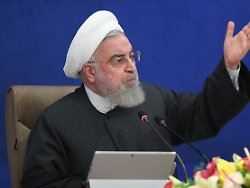Wednesday 17th February 2021
Nuclear dispute with the USA
Iran reduces cooperation with the IAEA
The 2015 Vienna Agreement is intended to prevent Iran from building an atomic bomb. Five and a half years later, there is de facto nothing left of this nuclear deal: Iran does not want any more inspectors from the International Atomic Energy Agency to enter the country – thus increasing the pressure on the USA.
Iran will reduce its cooperation with inspectors from the International Atomic Energy Agency (IAEA) starting next Tuesday. This was announced by the supervisory authority based in Vienna. Iran had informed the IAEA that it would no longer implement the voluntary transparency measures from the Vienna nuclear agreement as of February 23. In addition, Tehran has informed the IAEA that it will no longer adhere to the so-called additional protocol, which allows IAEA inspectors to visit at short notice.
Tehran had already threatened the UN nuclear authority with considerable restrictions on inspections yesterday if there is no breakthrough in the nuclear dispute with the US by the end of the month. "Director General Grossi has offered to travel to Iran to find a mutually acceptable solution so that the agency can continue its important verification work," the IAEA said.
The United States terminated the 2018 Trump Agreement
The unlimited access of the inspectors to the Iranian nuclear facilities on the basis of the IAEA additional protocol is part of the Vienna nuclear agreement of 2015, which should prevent Iran from building an atomic bomb. Without this access, nothing would de facto remain of the agreement. After the US withdrew from the agreement, Iran has also gradually ignored all technical templates in the deal since May 2019. Among other things, the country has started with a higher uranium enrichment and the production of uranium metal, is now working with faster centrifuges and is storing far more uranium than allowed in the nuclear deal.
Former US President Donald Trump resigned from the international nuclear treaty in May 2018. With tough sanctions and a policy of maximum pressure, he wanted to persuade the leadership in Tehran to negotiate an agreement with stronger and longer-term conditions. The sanctions in particular led to the worst economic crisis in Iran's history. Iranian President Hassan Ruhani continues to hope that the US will change course under President Joe Biden in order to save both the nuclear deal and the country from an economic collapse. According to Ruhani, however, the USA – and not Iran – must take the first step and return to the negotiating table.
Biden's government has signaled its willingness to return – under certain conditions. US Secretary of State Antony Blinken had said the US would do so if Tehran once again adhered to all terms of the agreement. A return to the 2015 agreement could only be the preliminary stage to a broader agreement that the Biden government wants to work towards with its US allies.
"With the decision to restrict cooperation with the International Atomic Energy Agency, Iran is sending a dangerous signal," said FDP foreign policy expert Alexander Graf Lambsdorff about Iran's decision. With the move, the Islamic Republic ensures a further escalation of the conflict. "The federal government should immediately call in the Iranian ambassador and, in coordination with the other partner states of the nuclear deal, call on the Iranian leadership to cooperate fully with the IAEA," said Lambsdorff.
. (tagsToTranslate) Politics (t) IAEA (t) nuclear program (t) Iran (t) Iranian nuclear program (t) Iran conflict (t) United Nations (t) UN Security Council (t) USA (t) Donald Trump (t ) Joe Biden (t) US Foreign Policy
